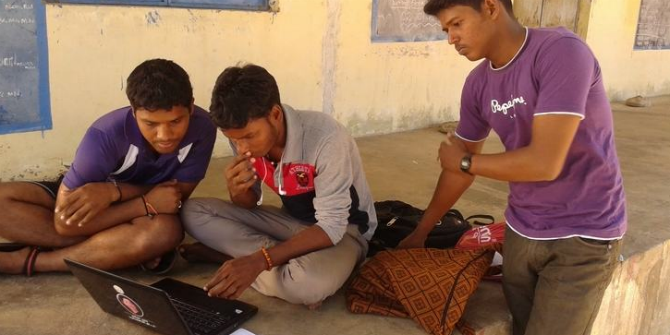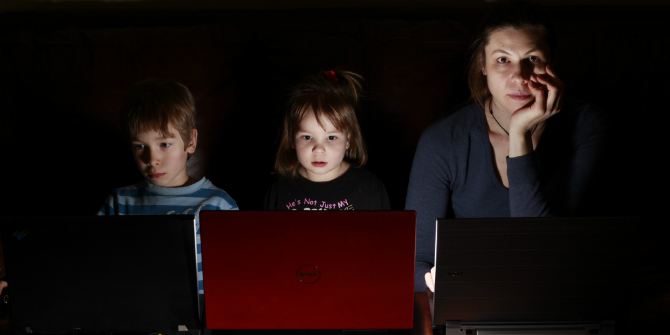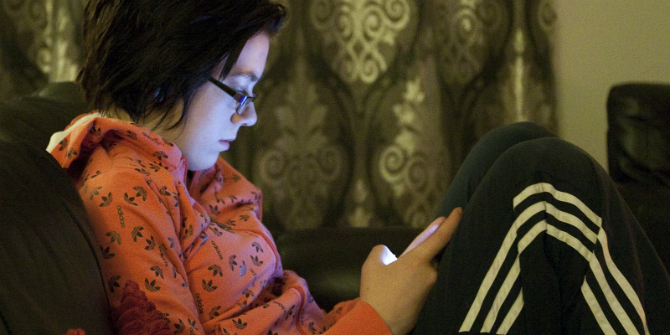 Children’s need for play in the current pandemic can be mapped in their imaginary farms, dens and worlds of Minecraft and dance routines on TikTok. As schools prepare for the next stage of the pandemic, Dr Becky Parry argues in this blog that play should be centre-stage of the curriculum for literacy learning.
Children’s need for play in the current pandemic can be mapped in their imaginary farms, dens and worlds of Minecraft and dance routines on TikTok. As schools prepare for the next stage of the pandemic, Dr Becky Parry argues in this blog that play should be centre-stage of the curriculum for literacy learning.
Online play is enjoyable but, as twelve-year-old Tilly Jackson from West Yorkshire shares below, what happens in Minecraft is far from trivial:
Me and my friend had a survival world in lockdown, and we spawned on a survival island, which has little to no food or supplies on. We had no animals and few trees to build with, but after a very long time, managed to build a base and have a small farm with pigs, chickens, and two horses. We also had a dog but sadly it drowned in the sea when we were fishing. This has taken us literally months because of where we were on the world, but we also created a fishing boat to take us to nearby islands where we found a treasure map… no luck with that so far. It was so much more satisfying doing it all from scratch.
Isaac Austin aged 10 from Leeds, created Christmas in Minecraft, complete with family presents declared: I really don’t know what I would have done without Minecraft. In this digital space he could share his fears about not having Christmas and show kindness to his family. Similarly Toby Little, aged 13 from Sheffield was able to create a nether and over world with his friends, complete with blue trees and lanterns. He explained the challenge and unpredictability of survival mode as something that ‘keeps his heart racing’. Headteacher, Rebecca Timperley, shared her delight in her grown up daughter’s use of SIMs where she recreated her own family.
There are many forms of play, all important, but imaginative play is particularly critical to literacy learning. This is well established in early years education where pretend play supports children’s early reading, writing and speech. However, as children move from early years settings to reception and upwards, play increasingly gives way to more formal teaching approaches to prepare children for performance in national tests. At school, children find ways to make up for this in their playground play with friends. At home in lockdown, especially where online learning has been dominated by downloadable worksheets, children have turned to digital media and especially Minecraft as a place for play.
Popular culture plays a critical role in enriching children’s play and learning. Whatever their resources, families try to support their children’s special interests whether that is a favourite game, comic or television programme. In the last year, more parents have been helping their children to work out how to make an animation or have found themselves being taught how to play Minecraft.
This in-the-moment, shared play creates the possibility of rich learning, related to children’s own interests. The learning may be unpredictable and not easily measured by tests, but this form of play enables children to ‘be’ someone other than themselves. Pretending to be an animal, a superhero or a ghost may seem like little more than enjoyable fun, but, in role, children embark upon ‘mature’ play where they learn social and cultural rules. They learn the rules of a particular genre of text, they learn about narrative structure and they learn to experiment with meaning. They might also begin to imagine what it would be like to be a teacher, nurse or scientist. Through play children also develop agency; they see the world from the point of view of someone more powerful than themselves. This provides a rich context for learning and reflection and for putting at a safe distance some of the issues that they most fear. By placing the pandemic in a context of play, children can explore their feelings and those of their families and try to make sense of the troubled world we have created for them.
Of course, primary aged children and young people may not play in the same way as the youngest children. They might prefer drama to dress up or filmmaking to playing with teddies, but there is still a need for these playful opportunities. Online spaces provide opportunities for sharing the playful production of films and videogames as well as more traditional literacy texts. Being in an online community can support learning about narrative and pleasure in texts as we see in examples of fan fiction created by children. Making films, apps, websites etc. is also key to developing digital literacies — the ability to read and make digital texts. If, as our current Secretary of State for Education in England and NI, suggests we ‘teach in rows,’ without dialogue, are we preparing children for a 21st century where reading, authoring and sharing digital texts is key to accessing opportunities to participate as citizens of a global world?
In a recent study for the Lego Foundation, we found that digital play was highly important to children, developing their creative habits such as curiosity, persistence, discipline, collaboration and particularly the ability to be imaginative. At this time, it seems obvious that there is no higher-level skill than to imagine the world as other than it is. This is the ‘possibility thinking’ that led to the creation of a vaccine and the use of 3D printers to manufacture protective clothing for frontline workers in our own iForge makerspace. And this thinking is far more likely to begin with designing a roller coaster in Minecraft than it is sitting in a row, rote learning how to spot a subordinate clause.
As children in the UK return to school, I worry more about the loss of the play opportunities that arose through boredom in lockdown, than I do about the nebulous concept of ‘learning loss’. Indeed, it would be timely to question a definition of education that is limited to the learning of easily forgotten facts and figures. The rhetoric of ‘levelling up’ that our politicians are propagating in the media is also disingenuous. For one thing, we cannot assume that education enhances social mobility, because currently, in this country at least, inequality has increased in this century. For another, there are far too many assumptions that children are disadvantaged by their own parents’ lack of knowledge or education, rather than by the structural inequalities embedded in society. Parents and grandparents, including those in poverty and with modest resources, are often highly competent at extending children’s learning through play, including dressing up, crafts, and stories alongside digital play and use of more traditional literacy learning apps.rk
Parents and teachers play a highly important role in supporting and encouraging play and this has never been as important as it is now. Far from playing catch up, children and young people need opportunities to continue to be playful. An invitation to write a story about anything you like, as simple as this may seem, is not so common in online or even school-based literacy lessons. However, this ‘free writing’ opportunity is critical to enabling children to be playful with both language and design.
As a nation, we should show gratitude and respect to our teachers for their dedication and compassion, but instead, we allow education to be a political football and teachers to be hounded by the tabloid press. I hope, however, that those who ‘under the radar of the curriculum’ provide playful literacy learning experiences for children will be encouraged to continue to do so. These experiences, such as makerspaces, digital storytelling and free writing, build on children’s interests so that learning is memorable and authentic. This is what teachers need time to catch up on with the children in their classes so that they can playfully reimagine a new world together.
Notes
This text was originally published on the research blog of the School of Education, University of Sheffield and has been re-posted with permission and small edits.
This post gives the views of the authors and does not represent the position of the LSE Parenting for a Digital Future blog, nor of the London School of Economics and Political Science.
Featured image: photo by Tima Miroshnichenko on Pexels






